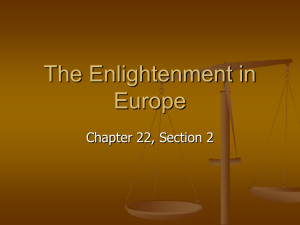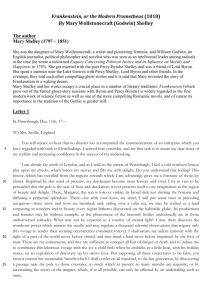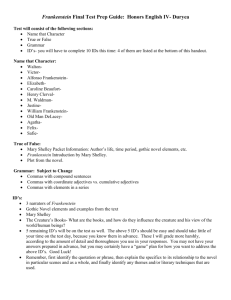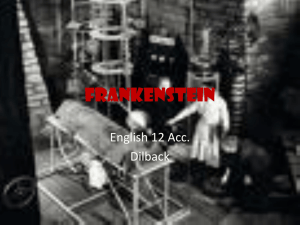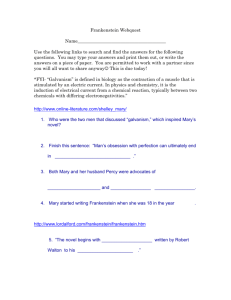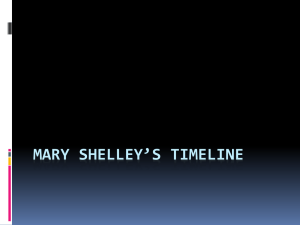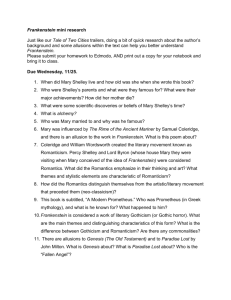Frankenstein Or The Modern Prometheus
advertisement
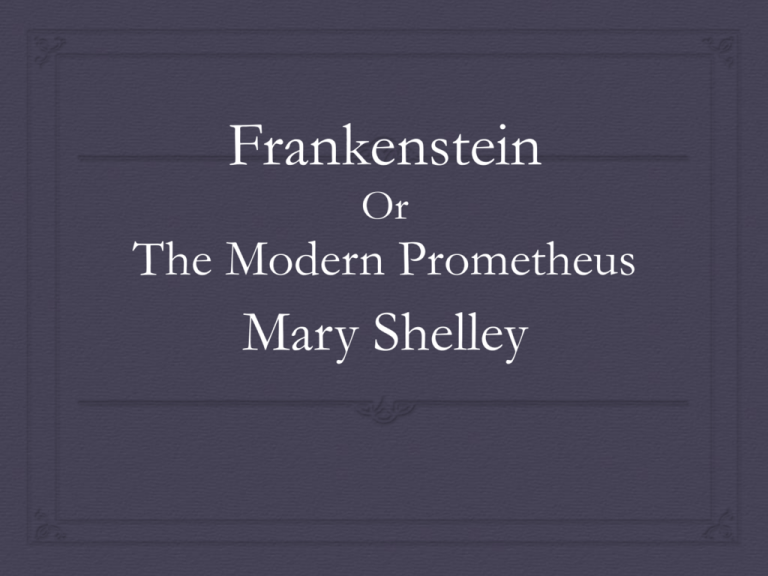
Frankenstein Or The Modern Prometheus Mary Shelley Mary Wollstonecraft Shelley Born August 30, 1797 in London Died February 1, 1851 of brain cancer Married poet Percy Shelley in 1816 Daughter of famous parents Father: William Godwin – philosopher and political writer Mother: Mary Wollstonecraft – famed feminist and author of Vindication of the Rights of Woman (1792) Mary’s mother died shortly after Mary was born Shelley’s Stormy Situations Father remarried and Mary did not get along with her new stepmother 1814: Mary began a relationship with poet Percy Shelley. While he was still married to his first wife, he and (16-year old!) Mary fled England together. Mary’s step-sister, Jane, went with them. SCANDAL!! Mary’s actions alienated her from her father and he didn’t speak to for four years. EXILE! 1815: Mary and Percy struggled financially and lost their first child. Mary delivered a baby girl who only lived for a few days. TRAGEDY : ( Shelley’s Stormy Situations 1816: Mary’s half-sister, Fanny, AND Percy’s wife, Harriet committed suicide (Harriet while pregnant with Percy’s third child!). Mary and Percy were married in December. : ( 1818: Frankenstein was published and was an overwhelming success. Mary was 20 years old. Mary and Percy did not have an easy marriage. They suffered from adultery and heartache. Two more of their children died. : ( 1819: Their son, William (“Will-mouse”), died of malaria. Percy Florence, their only child who survived, was born. : ) 1822: Mary miscarried and almost died. Percy Shelley drowned while sailing with a friend. : ( Romanticism 1785 – 1830: French Revolution to beginnings of modern industrialism Romantic writers favored the revolution and its changes in lifestyle and sensibility Writers had freedom to turn inward Reflect on issues of the heart and imagination Natural scenes and rustic, commonplace lifestyles Elements of the supernatural Romanticism Mary Shelley combined ethical concerns of her parents with Romantic sensibilities of Percy Shelley’s poetry Father’s concern for the underprivileged Percy Shelley’s use imagination, isolation, and nature Mary Shelley is unique because of her use of the Gothic novel Gothic Novel Mysteries in which sinister and sometimes supernatural events occurred Events caused by some evil human action Overly dramatic and inflated language Fascination with the macabre (disturbing and horrifying) and superstitions Unrealistic settings, away from everyday life (except Frankenstein) Frankenstein as a Gothic Novel Frankenstein reflects Shelley’s deepest psychological fears and insecurities Inability to prevent her children’s deaths Distressed marriage to a man who showed no remorse for his daughters’ deaths Feelings of inadequacy as a writer Deviation in Gothic setting Creature wanders breathtaking Alps – he becomes more humanized Epistolary Framing Device Epistolary novel: A novel told through letters, a convention of 1800 Romantic literature. Framing device: A literary device in which the same scene, event, or setting is used both at the beginning and at the end of any literary work. The repeated element creates a “frame” within which the work develops. Frankenstein – Robert Walton writes letters to his sister describing the story told to him by Victor Frankenstein. Frankenstein’s story contains the creature’s story. Who is Frankenstein? The Modern Prometheus Greek mythic figure who stole the secret of fire from the gods and gave it to humanity He received severe punishment for his hubris (excessive pride or self-confidence) Lesser-known myth: Prometheus creates the human race How does the novel’s subtitle foreshadow future events in Victor’s life? Paradise Lost Quotation from Milton’s Paradise Lost appears in an epigraph on the title page Examines the fall from grace in Eden, according to the Old Testament If Frankenstein is like Adam, what is Shelley trying to say about Victor? The Danger Zones Amoral science Unrestrained rationality Imperfection of civil justice Superficiality of human judgment Frankenstein is a book about the concurrent limits and limitlessness of human nature and human knowledge. Can humans control all consequences of their actions?
